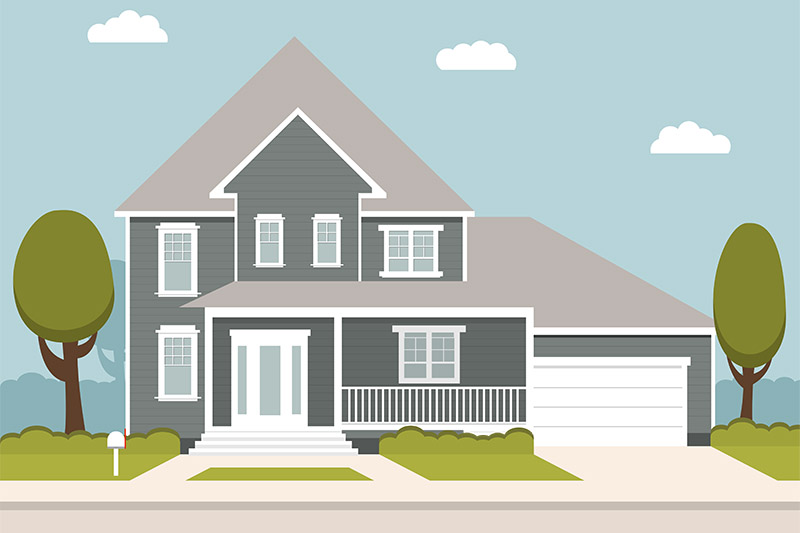Buying a home is one of the biggest financial decisions you’ll ever make, and timing…

Is the U.S. on the verge of its biggest housing boom ever?
Article from The Mortgage Reports with contributions from Vantage President, Andy Harris
Experts say, don’t wait for an uncertain boom in the market
Mortgage rates remain low. As a result, demand for homes has surged this year. It’s causing an epic housing shortage in the U.S.
Some experts think low rates and an influx of buyers have poised the U.S. for its biggest housing boom ever. Millennials are ready to buy, they say, and the real estate market will flood with new housing to accommodate.
Others aren’t so sure. They think Millennials could buck traditional home buying wisdom. And they worry new construction won’t be able to keep up with housing shortages.
In other words, the prophecied housing boom is far from a sure thing. If you’re planning to buy soon, you might not want to wait around for new stock to hit the market.
Start comparing mortgage rates today while they’re still low. With interest rates hovering below 4%, you might be able to afford a more expensive house currently on the market than you think.
Is a housing boom coming?
A recent article published in Forbes suggests that the largest housing boom in U.S. history is already underway.
“In the past year or two, the first wave of young homebuyers came into the market. But every year for the next decade, tens of millions of Millennials will hit home-buying age.” –Barry Habib, Founder and CEO of MBS Highway, via Forbes
One bit of evidence the article cites is that the largest American generation in history, Millennials, is reaching prime home-buying age.
The median age of millennials right now is 34. And the average age when people traditionally buy their first home is 33.
Another factor the article cites is that U.S. home construction recently jumped over 12% and reached its highest level since 2007. Building permits are up 7.7% from a year ago. And homebuilder stocks are booming.
But are these influences strong enough to power a record housing boom? Other housing experts are less certain.
Arguments for a pending housing boom
Housing experts can see a strong case for an upcoming housing boom. They cite a number of reasons for this:
- Millennial demand for housing is rising in recent years
- Young buyers are more educated about buying than previous generations
- Job and wage growth increases affordability for buyers
Jeremy Sopko, CEO of Nations Lending, agrees that millennials are positioned to flood the market and increase demand for housing.
“According to our own data, that’s true, as of at least 2017,” he says. “From 2017 to 2018, millennials grew their share of the home buying marketplace by 24% in the most affordable markets in the U.S. It would only make sense that this trend would continue — not only in those specific markets but more broadly as well.”
Andy Harris, president of Vantage Mortgage Group, feels similarly.
“It’s simple to see that, with the number of millennials coming to home-buying age, the demands for housing will increase,” says Harris. He notes that Gen Y is better prepared and more educated about buying today than years ago, too.
Rick Sharga is president and CEO of CJ Patrick Company. He believes that the market appears on the verge of a housing boom.
“Demand has outpaced supply for a number of years. That’s even before millennials started forming new households in massive numbers,” says Sharga.
“We’ll likely see over a million new households created in 2019, as a conservative estimate. So as annual household formation increases, the demand for homes will accelerate.”
Sharga says the biggest drivers for a potential housing boom are growing demand and improving economic conditions.
“Both job growth and wage growth are strong right now. Plus, interest rates remain near historic lows. These factors improve affordability,” Sharga adds.
The only X factor at play here? “Can builders meet the growing need for new homes?” asks Sharga.
Arguments against a housing boom
On the flip side, several things can prevent a housing boom. Many of the same people who recognize the potential for housing growth also list factors that could limit it:
- Lack of inventory will prohibit a housing boom on a massive scale
- Millennials are cautious buyers that may not follow historical trends
- Many young buyers feel unprepared to purchase a home, often citing debt or lack of savings as a main concern
“The first [roadblock] is a critical lack of inventory. There is roughly only a four-month supply of existing homes available for sale. That’s 30% lower than a healthy housing market,” says Sharga.
Without enough supply, “you have no boom—at least not the ‘biggest boom ever,’” Sopko says.
Another uncertainty is millennial buying habits.
“Buying habits have changed greatly from generation to generation. I believe millennials are a much more cautious buyer,” says Ralph DiBugnara, founder of Home Qualified.
“That’s because they came of age during the real estate bubble 10 years ago. So they may not follow historical trends.”
Consider, too, that surveys show many first-time buyers don’t feel prepared to purchase. And lots of millennials feel stressed about owning a home.
Sopko believes we probably won’t see a spike in new construction in response to increased millennial demand, either.
And affordability remains a top concern for all buyers, as home prices are consistently on the rise.
“The lack of homes that are affordable to many buyers today is something that could slow down a housing boom considerably,” says Sopko.
Also, “we have to question how many baby boomers will want to downsize and go into retirement communities. When they do this, they add more housing inventory to the market,” Harris notes.
Buy now or wait for a better deal?
With low housing supply and high demand, it’s easy to understand why home prices remain out of reach for many buyers.
That begs the question: Should you wait for more inventory to hit the market and for interest rates to possibly sink lower? Or should you strike now and look for the best deal you can find?
“There’s no reason not to look seriously at buying today. Rates may not get any lower. And home prices are likely to continue to rise.” –Rick Sharga, President and CEO, CJ Patrick Company
“Compare today’s interest rates to what they were a year or two ago. That comparison tells you yes, it’s a great time to act and purchase a home — assuming you have the means to do so,” says Sopko.
He continues, “While rates can decline a bit further next year, it’s not likely to make a meaningful difference to the average buyer. Even if rates fall further after you buy, you can always refinance.”
Sharga seconds those sentiments.
“If you’re qualified to buy a home and plan to live in that home for the foreseeable future, there’s no reason not to look seriously at buying today. Rates may not get any lower,” says Sharga. “And home prices are likely to continue to rise.”
See what you could afford today
A housing boom could mean better inventory and more competitive prices. But it’s far from certain that a boom is actually coming.
If you want to buy soon, it might make more sense to take advantage of today’s low-rate environment. Low mortgage rates are key to making even expensive homes a lot more affordable. Get a personalized rate quote to see what you could afford today.




